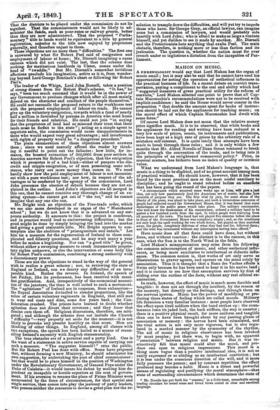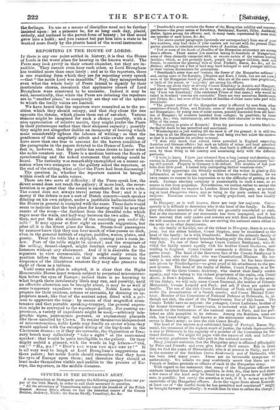MAHON ON MUSIC.
A PHRENOLOGIST would say that Lord Mahon has the organ of music small ; but it may also be said that he cannot have used his opportunities for noting the operation of assthetical influences in the practical business of life. In a recent debate on convict trans- portation, paying a compliment to the zeal and ability which had suggested measures of great practical utility for the reform of convicts," Lord Mahon selected one point to prove that all Cap- tain Maconochie's recommendations were not to be received with implicit confidence : he said the House would never concur in the proposition " that double the amount spent for books of instruc- tion should be laid out for the appliances for teaching music ; on the moral effect of which Captain Maconochie had dwelt with some force."
Of course Lord Mahon does not mean that the relative money price signifies much. It is to be observed, that while books and the appliances for reading and writing have been reduced to a very low scale of prices, music its instruments and publications, have been kept at a high rate Of prices by the arbitrary rule of a mistaken self-interest. It is quite lately that attempts have been made to break through these rules ; and it is only within a few months that Mr. Alfred Novello of Dean Street ventured to break quite through the convention of the trade, and to bring into it the principles of an enlightened commercial policy.* Price, in musical matters, has hitherto been no index of quality or intrinsic value.
What we understand from Lord Mahon's language is, that music is a thing to be slighted, and of no great account among men of practical wisdom. He should know, however, that it has been found by the most practical men as the most useful auxiliary to discipline • and he ought to stand rebuked before an anecdote that has been going the round of the papers. "A circumstance which occurred some weeks ago at Lim, will give a just idea, not only how passionately fond the Austrians are of music, but also bow unstable of purpose they are. The first trial by jury, for some abuse of the liberty of the press, was about to take place, and such a tremendous concourse of people had collected round the Government House, that it was feared that some disturbance of the public peace would take place. The military commander, who well knew the weaknesses of his countrymen, ordered a military band to be posted a few hundred yards from the spot, to which people were hurrying from all quarters of the town. The band had not played five minutes before the place in front of the Government House was completely empty ; and, as the musicians not only kept the spell working for two whole hours, but played as they marched away, the people, completely oblivious of what they had met for, followed them; and the trial was terminated without any interruption having been offered."
Here music does all that force could have done, but without force, and without reaction : the clarinet is to the cannon, in this case, what the Sun is to the North Wind in the fable. Lord Mahon's misappreciation may arise from his following the common misconception of music, and other cesthetical influ- ences, as being mere auxiliaries to intellectual or didactic influ- ences. The common notion is, that works of art only serve as illustrations to graver agents, and operate on the mind solely by association. Thus it is thought that a Ranz des Vaches affects a Swiss only because he has been used to bear it in his native land ; and it is curious to see how that assumption survives by dint of sliding over the surface of the facts, without any real critical ex- amination.
In truth, however, the effect of music is much more forcible and tangible : it does not act through the intellect, by the reason or the memory, but directly on the feelings, and through them on the nervous system. Music has the power of modifying or pro- ducing those states of feeling which are called moods. Military life furnishes a very familiar instance : most people have observed the effect upon tired soldiers when the band strikes up : the coun- tenance loses its jaded look, the back stiffens, the step is smarter ; there is a positive physical result, far more uniform and tangible than one to have been brought about by any passing gleam of association or memory : the nerves have been stimulated, and the vital action is not only more vigorous, but is also regu- lated in a marked manner by the symmetry of the rhythm. The aid of music in religious observances has been invoked by most peoples; yet there was, to begin with, no apparent ' association ' between religion and music. But it was in- stinctively felt that music could alter the mood, and is one open to religious impressions. This mood s a thing more vague than a positive intellectual idea, it is not so easily expressed or so abiding as an intellectual conviction ; but it is less under the conscious direction of the will, and it more fully possesses the person • and by constant repetition the effect produced may become a habit. Music is a direct and powerful means of regulating and purifying the moral atmosphere—that state of surrounding circumstances which determines the state of
• Mr. Novello has put forth his " reasons," in a little tract, remarkable among trading circulars for sound sense and broad views stated in clear and excellent language.
the feelings. Its use as a means of discipline need not be further insisted upon: let a prisoner be, for so long each day, placid, _orderly, and inclined to the purest form of beauty ; let that mood grow into a habit ; and you cannot but put him into a state to be worked more freely by the plastic hand of the moral instructor.



























 Previous page
Previous page